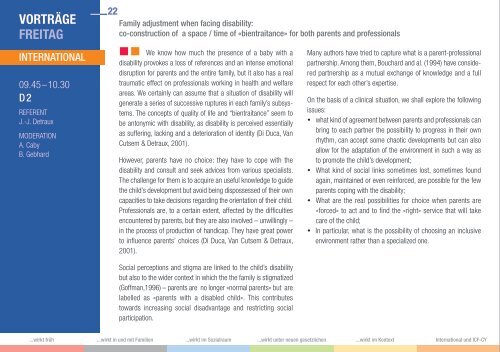PROGRAMM
VIFF-Programm2
VIFF-Programm2
Erfolgreiche ePaper selbst erstellen
Machen Sie aus Ihren PDF Publikationen ein blätterbares Flipbook mit unserer einzigartigen Google optimierten e-Paper Software.
VORTRÄGE<br />
FREITAG<br />
22<br />
Family adjustment when facing disability:<br />
co-construction of a space / time of «bientraitance» for both parents and professionals<br />
Familiäre Balance im Zusammenhang mit einer Behinderung:<br />
Ko-Konstruktion eines Raumes positiver Lebensqualität (bientraitance) sowohl für Eltern wie für Fachleute<br />
23<br />
VORTRÄGE<br />
FREITAG<br />
INTERNATIONAL<br />
09.45–10.30<br />
Roter D2 Saal<br />
nREFERENT<br />
Nr. D2<br />
J.-J. Detraux<br />
Referenten<br />
MODERATION<br />
Prof. emeritus<br />
A. Caby<br />
B.<br />
J.-J.<br />
Gebhard<br />
Detraux<br />
We know how much the presence of a baby with a<br />
disability provokes a loss of references and an intense emotional<br />
disruption for parents and the entire family, but it also has a real<br />
traumatic effect on professionals working in health and welfare<br />
areas. We certainly can assume that a situation of disability will<br />
generate a series of successive ruptures in each family’s subsystems.<br />
The concepts of quality of life and “bientraitance” seem to<br />
be antonymic with disability, as disability is perceived essentially<br />
as suffering, lacking and a deterioration of identity (Di Duca, Van<br />
Cutsem & Detraux, 2001).<br />
However, parents have no choice: they have to cope with the<br />
disability and consult and seek advices from various specialists.<br />
The challenge for them is to acquire an useful knowledge to guide<br />
the child’s development but avoid being dispossessed of their own<br />
capacities to take decisions regarding the orientation of their child.<br />
Professionals are, to a certain extent, affected by the difficulties<br />
encountered by parents, but they are also involved – unwillingly –<br />
in the process of production of handicap. They have great power<br />
to influence parents’ choices (Di Duca, Van Cutsem & Detraux,<br />
2001).<br />
Many authors have tried to capture what is a parent-professional<br />
partnership. Among them, Bouchard and al. (1994) have considered<br />
partnership as a mutual exchange of knowledge and a full<br />
respect for each other’s expertise.<br />
On the basis of a clinical situation, we shall explore the following<br />
issues:<br />
what kind of agreement between parents and professionals can<br />
bring to each partner the possibility to progress in their own<br />
rhythm, can accept some chaotic developments but can also<br />
allow for the adaptation of the environment in such a way as<br />
to promote the child’s development;<br />
What kind of social links sometimes lost, sometimes found<br />
again, maintained or even reinforced, are possible for the few<br />
parents coping with the disability;<br />
What are the real possibilities for choice when parents are<br />
«forced» to act and to find the «right» service that will take<br />
care of the child;<br />
In particular, what is the possibility of choosing an inclusive<br />
environment rather than a specialized one.<br />
Wir wissen wie sehr die Geburt eines Babys mit einer<br />
Behinderung zu einem Verlust der Stabilität und zu intensiver emotionaler<br />
Spannung für die Eltern und die gesamte Familie, ebenso<br />
wie zu einer Zerreißprobe in den familiären Subsystemen führen<br />
kann. Konzepte der Lebensqualität und der „guten Behandlung“<br />
(bientraitance) scheinen einer Behinderung entgegen zu stehen.<br />
Schließlich wird eine Behinderung vorwiegend als Leiden, Mangel<br />
und Zusammenbruch der Identität wahrgenommen. Dennoch bleibt<br />
den Eltern meist nichts anderes übrig, als sich von unterschiedlichen<br />
Spezialisten beraten zu lassen, um mit der Situation umzugehen.<br />
Fachleute sind bis zu einem gewissen Grade von den Schwierigkeiten<br />
der Eltern mit betroffen, und sie sind ungewollt einbezogen<br />
in einen Prozess der Verfestigung einer „Behinderung“. Soziale<br />
Wahrnehmung und Stigmatisierung sind mit der Beeinträchtigung<br />
des Kindes verbunden, aber ebenso in einem weiteren Sinn, indem<br />
die ganze Familie stigmatisiert wird. Das führt zunehmend zu<br />
sozialer Benachteiligung und eingeschränkter sozialer Partizipation.<br />
Etliche Autoren haben versucht zu präzisieren, worum es sich bei<br />
einer Partnerschaft zwischen Eltern und Fachleuten handeln<br />
könnte. Es geht um die Fragen der Vereinbarkeit zwischen fachlichen<br />
Aspekten und den Vorstellungen der Eltern, d. h. die Fragen<br />
nach „wahren“ Wahlmöglichkeiten der Eltern sowie der Gestaltung<br />
einer inklusiven Frühförderung. Auf der Grundlage einer klinischen<br />
Situation wollen wir auf die Fragen zur Vereinbarkeit zw. Fachleuten<br />
und Eltern, den sozialen Bezügen, der Frage nach „wahren“ Wahlmöglichkeiten<br />
der Eltern sowie der Gestaltung einer inklusiven<br />
Frühförderung eingehen.<br />
INTERNATIONAL<br />
09.45–10.30<br />
D2<br />
(Fortsetzung)<br />
Social perceptions and stigma are linked to the child’s disability<br />
but also to the wider context in which the the family is stigmatized<br />
(Goffman,1996) – parents are no longer «normal parents» but are<br />
labelled as «parents with a disabled child». This contributes<br />
towards increasing social disadvantage and restricting social<br />
participation.<br />
...wirkt früh ...wirkt in und mit Familien ...wirkt im Sozialraum ...wirkt unter neuen gesetzlichen ...wirkt im Kontext International und ICF-CY ...wirkt früh ...wirkt in und mit Familien ...wirkt im Sozialraum ...wirkt unter neuen gesetzlichen ...wirkt im Kontext International und ICF-CY


